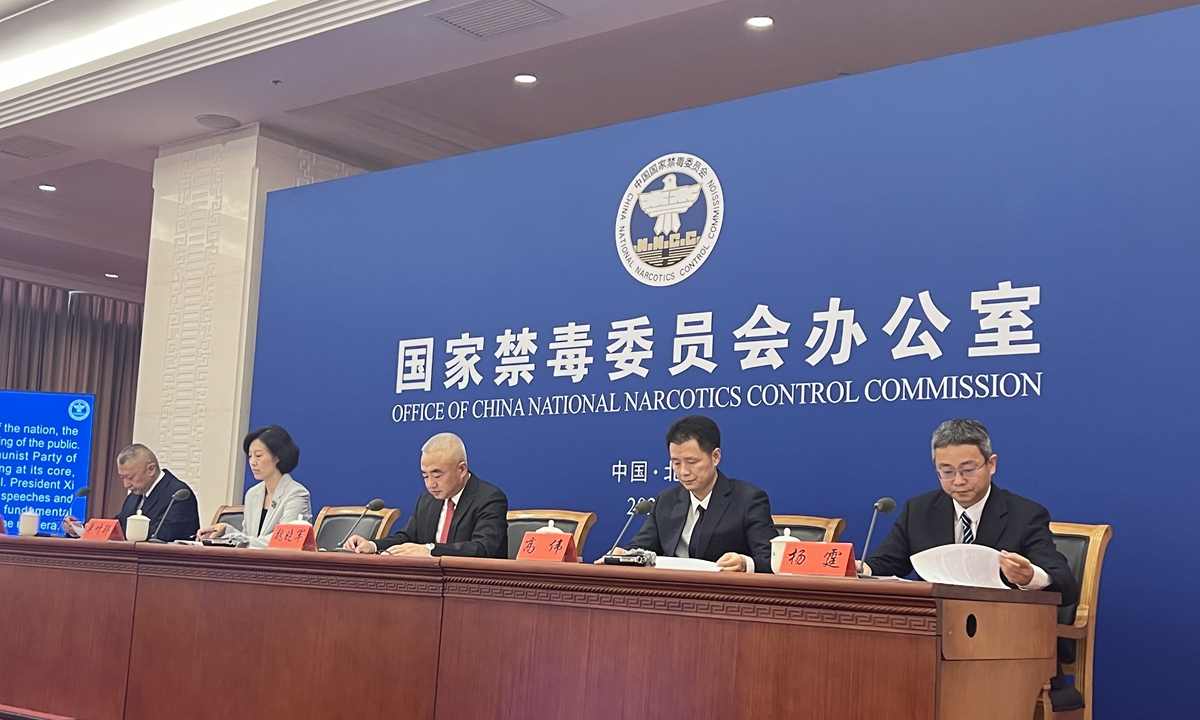
Photo of the press conference
The final scheduling of the US highly concerned specific fentanyl precursors will be completed through the relevant legal procedures in the coming months, according to an official from China's Ministry of Public Security (MPS)'s narcotics control bureau. The official offered detail of a money laundering case in anti-drug cooperation with the US, and said investigation is still underway.
Narcotics control teams between China and the US have been promoting substance scheduling, intelligence exchange, case cooperation, anti-money laundering involvement, technical exchange, cleaning of online advertising information, and cooperation in multilateral areas, Wei Xiaojun, head of the MPS's narcotics control bureau said at a press conference on Wednesday.
China is also actively working on the scheduling of types of fentanyl precursors that the US remains highly concerned about, Wei said. "I believe that the scheduling of these three fentanyl precursors that the US is concerned about will be completed within a few months through the necessary legal procedures, achieving the final outcome."
Currently, law enforcement departments in China and the US are conducting joint investigations into several key cases, and some cases have made breakthrough progress, Wei noted.
Following US tipoffs relating to drugs and money laundering, Chinese police launched an investigation into a case involving illegal foreign exchange transactions, the MPS revealed on Wednesday.
The investigation found that, since 2017, a suspect surnamed Tong started a car dealership in the US and offered exchange services between Chinese yuan and US dollars. The operation later evolved into criminal activities including the illegal trading of foreign currencies.
Tong has already been arrested, and further investigation is underway, the ministry said.
On Tuesday, US prosecutors, noting that the suspect involved in the money laundering case was working with Mexican drug cartels, announced charges against 24 people who allegedly took part in a scheme to launder more than $50 million in drugs.
The US has been investigating this case since 2019, but only shared limited intelligence information with China three months ago, Wei told the Global Times on Wednesday.
During the three months of investigation, the suspects, including Tong, were successfully captured, said Wei. However, he noted that the charges cited by the US and Chinese sides in this case are different. The US is investigating drug trafficking and money laundering, while the Chinese side is investigating illegal foreign exchange transactions.
US prosecutors allege the leaders of the money laundering ring, Edgar Joel Martinez-Reyes and Tong, traveled to Mexico to strike a partnership with the Sinaloa Cartel in 2021. The men were photographed together in a car at the San Ysidro border crossing, returning from what authorities said was a cartel meeting, US media reported.
The US Justice Department on Tuesday also accused Chinese "underground bankers" of helping Mexico's Sinaloa Cartel launder more than $50 million in drug trafficking proceeds.
The existing information and evidence obtained from intelligence provided by the US and the in-depth investigation conducted by China, however, cannot confirm that Tong, a 27-year-old Chinese man, was involved in organizing, planning, and implementing a large-scale underground money laundering operation in China, the US, and other regions, Wei said.
Wei said that he does not deny the existence of "underground bankers" in China. "We also take a firm stance against those underground bankers, which are intertwined with transnational organized crime such as drug trafficking, smuggling and illegal cross-border trade. The illegal activities related to these crimes are very complex and are a difficult focal point faced by all countries around the world," Wei explained.
China hopes to work with all countries, including the US, to engage in practical and effective cooperation based on mutual respect and trust, rather than engaging in exaggerated and excessive interpretations, Wei noted.
"We are firmly against the US constantly blaming China for its own fentanyl problems. As such accusation and smearing won't solve these problems. Only pragmatic and effective solutions are the way out," Wei pointed out.




